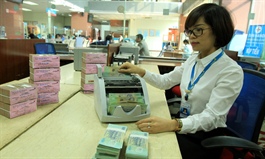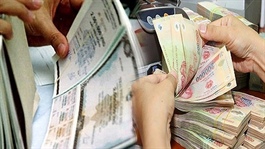Vietnam must reverse image of currency manipulator
Vietnam must reverse image of currency manipulator
Saigon Investment ran a series of articles on 21 December to analyse why Vietnam was identified by the USA as a currency manipulator. In a subsequent discussion with Dr. NGUYEN DUC DO, Deputy Director of the Ho Chi Minh City University of Economics and Finance, Saigon Investment learnt more on how Vietnam must now deal with such as a tag.
Illustrative photo.
|
JOURNALIST: - Sir, what is your opinion on this tough move made by the USA?
Dr. NGUYEN DUC DO: - In my opinion, the US probably does not actually want to see Vietnam as a currency manipulator, because they do not gain much from such a decision. By asking Vietnam to appreciate the local currency or to impose tariffs on Vietnamese goods does not solve the US trade deficit problem. The main reason for the large scale trade deficit is due to their economic model that relies heavily on consumer demand. If there is less consumer demand, the US may spread imports from other countries besides Vietnam.
Reality shows that when the US imposes tariffs and reduces imports from China, their imports from countries like Vietnam increase. Based on this analysis, if the US enacts measures to restrict imports from Vietnam, they will have to increase imports from Thailand, India and other such manufacturing countries. In exports Vietnam is a small market for the US, so increasing exports is probably not the main goal of the US, which exceeds in scale of USD 20,000 bn. The US has imposed high tariffs on Chinese goods over the last few years to balance the trade and also weaken the economy of its biggest competitor, and Vietnam is not a competitor for the US in any way.
- Sir, when Vietnam is labeled a currency manipulator with risk of more imposed tariffs, what are the options left for us to deal in such a situation?
- We do not feel comfortable being viewed as a currency manipulator, so something needs to be done to reverse this unpleasant situation. However, policy adjustments need to take into account the overall benefits. In order not to be labeled as a currency manipulator, we must get out of at least one difficult criterion. The criteria that the bilateral trade surplus with the US does not exceed USD 20 bn is very difficult to change, because the scale of Vietnam's trade surplus with the US in the first eleven months of 2020 is already at nearly USD 60 bn. Therefore, even if we fully open the domestic market for US goods, the scale of Vietnam's trade surplus with the US will still be greater than USD 20 bn.
It should be noted that the scale of Vietnam's exports to the US have increased rapidly over the last few years due to the US-China trade war. As Chinese goods entering the US market are subject to higher tariffs and have become less competitive, Vietnamese enterprises have been taking advantage of this situation to focus on increasing exports to the US. So, if the US-China trade war still doesn't cool down for some time, the trade surplus between Vietnam and the US is likely to continue to rise. Figures show that while Vietnamese exports to the US in 2019 grew by 27.8%, and in the first eleven months of this year by 25.7%, exports to the EU showed a sharp decrease.
For the overall current surplus criterion of more than 2% of GDP, which is one of the three criteria that the US applies to Vietnam, the figure of USD 20 bn in the first eleven months of 2020 is inappropriate. The Covid-19 pandemic has slowed down our country's economic growth and weakened aggregate demand, so imports have fallen sharply and the surplus has increased as a result. In addition, the US dollar depreciating by about 10% in the last one year has also caused the Vietnam dong to depreciate sharply against regional currencies, leading to a competitive advantage for Vietnamese exporters. However, the high trade surplus will not last long. In coming time, when the economy finally recovers and imports increase, the trade surplus will gradually decrease, but it may take a few more years to return to the equilibrium of below 2% of GDP.
Regarding the State Bank of Vietnam's net buying of foreign currency, this is the result of a trade balance surplus as well as overall balance of payments. In coming years, the surplus will not be as large as this year, so the pressure to buy foreign currency will decrease. However, I think the State Bank of Vietnam should calculate that the Vietnam dong will appreciate slightly more against the US dollar in 2021.
- Sir, how do you predict the outlook in coming time? Is there a possibility that Vietnamese goods exported to the US will be subject to import tax?
- With Vietnam being labeled as a currency manipulator, some US businesses may take advantage and sue Vietnamese enterprises for dumping of goods. Some Chinese small household-run enterprises may also fall under the radar of the US Department of Finance. However, the possibility of the US imposing tariffs on Vietnamese goods on a large scale will not be good in my opinion, because it will not bring any significant benefit to the US. However, we also need to give the US side a few reasons to take Vietnam off the list of currency manipulating countries.
As mentioned above, letting the dong currency go up slightly in the coming year might be one solution. The price increase of about 1% per year, even 2% per year, will not affect the macro-economic stability or the competitiveness of exporters, especially when the US dollar is on a downtrend in the international market. Macro-economic stability will help Vietnam mobilize foreign investment. In fact, past years show that Vietnam's exports are relatively stable even when the US dollar and the Vietnamese dong appreciate against other currencies in the region.
Vietnam could also consider opening more options in the domestic market for US goods, such as agricultural products, without being too concerned about the competitiveness of domestic goods. This year, we have seen foreign pork in our stores, which although not cheap can easily dominate the domestic market, because consumer taste is the final deciding factor.
- Thank you very much.























